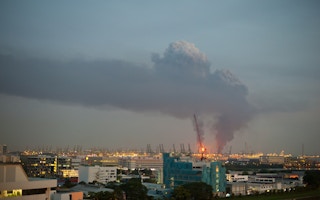Is investment in fossil fuels a prudent bet? For some time, critics have been warning major oil and gas companies that their reserves could soon be worthless if the world acts decisively on climate change.
The world’s biggest oil company, Shell, recently insisted that its reserves would remain in demand and would continue to sell at a profit, and that no global climate agreement would damage its profits.
But now two groups − the Carbon Tracker Initiative (CTI) and Energy Transition Advisors (ETA) − have today published a response to Shell’s “stranded assets” statement.
The debate itself is warming up, with one critic dismissing Shell’s statement as “Orwellian doublethink”.
The thinktanks’ reply is based on a detailed technical analysis of Shell’s argument. They say they welcome the company’s engagement with the issue, but accuse it in effect of cherrypicking the arguments to suit its case.
“
Acknowledging the seriousness of the climate challenge whilst at the same time asserting no effective action will be taken until the end of the century is as classic a case of Orwellian doublethink as you are likely to find
Anthony Hobley, CEO of Carbon Tracker Initiative
Weaker demand
Shell’s approach, they say, is based on dismissing potentially weaker demand for its oil as a result of tougher climate policies, technological advances and slower economic growth.
They also say the company selectively applies different timelines to fit its business strategy, highlighting conventional projects with short lead times and lower capital costs, rather than its growing unconventional and deepwater resources portfolio. This will be more capital-intensive, have longer lead times, and extended payback periods.
Shell, they say, considers only its proven oil and gas reserves, equalling 11.5 years of production at current rates. Adding existing discoveries would extend that period to 25 years, and possibly longer.
The analysis by CTI and ETA points out that while Shell recognises the need for urgent action, it argues that the world will fail to meet the internationally-agreed global warming target of no more than a 2°C rise in temperature.
Anthony Hobley, CEO of CTI, said: “Acknowledging the seriousness of the climate challenge whilst at the same time asserting no effective action will be taken until the end of the century is as classic a case of Orwellian doublethink as you are likely to find.”
The groups also say the company relies on carbon capture and storage (CCS) as a panacea to combat climate change, although it has yet to prove itself at a commercial scale. CTI’s 2013 research showed that CCS could provide only a limited extension (14 per cent) of the carbon budget − the amount the world can afford to emit − to 2050.
Shell’s response, the report’s authors say, selectively focuses on producing oil fields and projects nearest to completion. They point out: “Our analysis examines a broader range of its assets… Over the next 10 years, we estimate that Shell could invest some $77 billion in high-risk, high-cost projects (needing a market price over US$95 per barrel).
“If Shell invests the proceeds from its producing assets into resources such as these, it will be at a progressively greater risk to changes in demand caused by measures to cut pollution.”
Unlike Shell, they say, they believe that climate regulation and related environmental policy is gathering pace, while other economic forces such as efficiency are also affecting demand.
Mothballed projects
They believe there is a real risk that global oil demand will decline within the next 10-15years − even without a global climate deal. They say that the lead times of 15-20 years required to bring many newly-discovered resources to market will only compound the possibility that scarce pension fund money and other investments will be lost in mothballed projects.
Oil companies, they recommend, should examine and disclose risks to all potential future production, rather than restricting focus to proven reserves alone.
Shell should also provide more detail on the role its internal carbon price of $40 per tonne plays in hitting demand for its oil, and its $77 billion of potential capital expenditure (2014-25) on new high-cost oil production (above a market price of $95 per barrel) ought to be a focal point for engagement with investors.
To help shareholders to assess risk, oil companies should disclose estimated break-even oil prices (BEOPs) of all new projects, CTI and ETA argue.

















